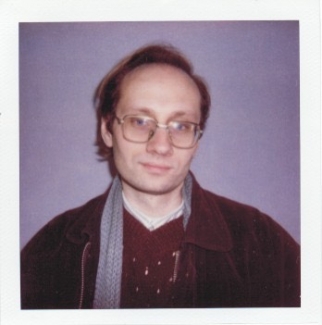Avdeenkov
Nickname: Sasha
Member of group: 1999-2004; also visited in 2006
Current whereabouts: National Institute of Theoretical Physics, Stellenbosch, South Africa
Quote: "It's the usual. "
Avdeenkov publications with the group
Ultracold Collisions of Oxygen Molecules -- A. V. Avdeenkov and J. L. Bohn, Phys. Rev. A 64, 052703 (2001).
Collisional Dynamics of Ultracold OH Molecules in an Electrostatic Field -- A. V. Avdeenkov and J. L. Bohn, Phys. Rev. A 66, 052718 (2002).
Rotational Feshbach Resonances in Ultracold Molecular Collisions -- J. L. Bohn, A. V. Avdeenkonv, and M. P. Deskevich, Phys. Rev. Lett 89, 203202 (2002).
Linking Ultracold Polar Mollcules -- A. V. Avdeenkov and J. L. Bohn, Phys. Rev. Lett. 90, 043006 (2003).
Field-Linked States of Ultracold Polar Molecules -- A. V. Avdeenkov, D. C. E. Bortolotti, and J. L. Bohn, Phys. Rev. A 69, 012710 (2004).
Ultracold Collisions of Fermionic OD Radicals -- A. V. Avdeenkov and J. L. Bohn, Phys. Rev. A 71, 022706 (2005).
Pair Wave Functions in Atomic Fermi Condensates -- A. V. Avdeenkov and J. L. Bohn, Phys. Rev. A 71, 023609 (2005).
Suppression of Inelastic Collisions of Polar 1 S State Molecules in an Electrostatic Field -- A. V. Avdeenkov, M. Kajita, and J. L. Bohn, Phys. Rev. A 73, 022707 (2006).
Bose-Fermi Mixtures Near an Interspecies Feshbach Resonance: Testing a Nonequilibrium Approach -- D. C. E. Bortolotti, A. V. Avdeenkov, C. Ticknor, and J. L. Bohn, J. Phys. B. 39, 189 (2006).
Stability of Fermionic Feshbach Molecules in a Bose-Fermi Mixture -- A. V. Avdeenkov, D. C. E. Bortolotti, and J. L. Bohn, Phys. Rev. A 74, 012709 (2006).
Generalized Mean-Field Approach to a Resonant Bose-Fermi Mixture -- D. C. E. Bortolotti, A. V. Avdeenkov and J. L. Bohn, Phys. Rev. A 78, 063612 (2008).

National Institute of Theoretical Physics, Stellenbosch, South Africa


 The Physics Frontiers Centers (PFC) program supports university-based centers and institutes where the collective efforts of a larger group of individuals can enable transformational advances in the most promising research areas. The program is designed to foster major breakthroughs at the intellectual frontiers of physics by providing needed resources such as combinations of talents, skills, disciplines, and/or specialized infrastructure, not usually available to individual investigators or small groups, in an environment in which the collective efforts of the larger group can be shown to be seminal to promoting significant progress in the science and the education of students. PFCs also include creative, substantive activities aimed at enhancing education, broadening participation of traditionally underrepresented groups, and outreach to the scientific community and general public.
The Physics Frontiers Centers (PFC) program supports university-based centers and institutes where the collective efforts of a larger group of individuals can enable transformational advances in the most promising research areas. The program is designed to foster major breakthroughs at the intellectual frontiers of physics by providing needed resources such as combinations of talents, skills, disciplines, and/or specialized infrastructure, not usually available to individual investigators or small groups, in an environment in which the collective efforts of the larger group can be shown to be seminal to promoting significant progress in the science and the education of students. PFCs also include creative, substantive activities aimed at enhancing education, broadening participation of traditionally underrepresented groups, and outreach to the scientific community and general public.